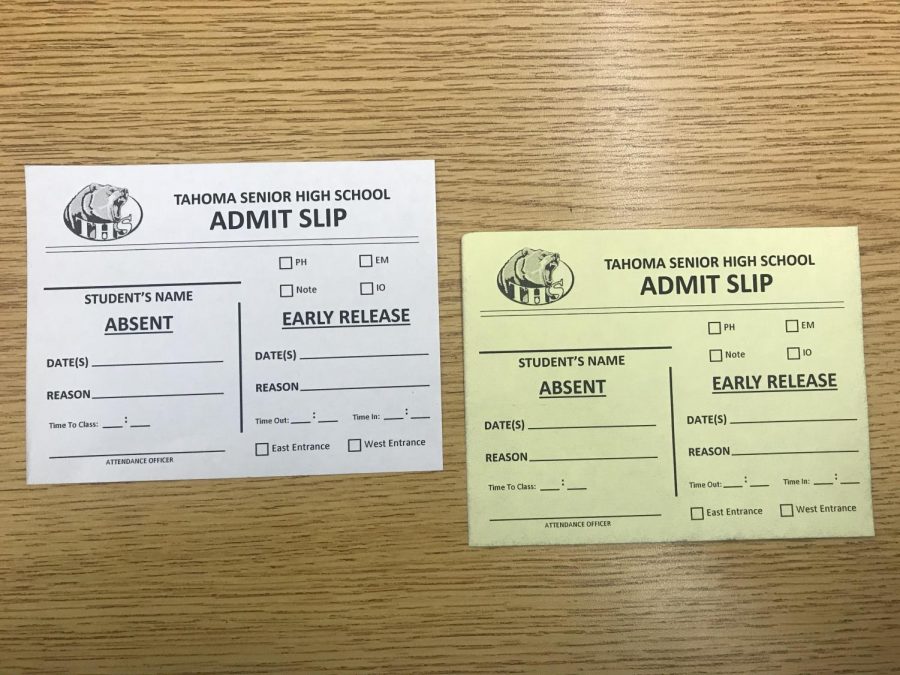Late to the Party?
June 4, 2018
With the move to the new high school and adding about 700 freshman, Tahoma also gained almost 1,000 more tardies in the morning class periods. Tahoma High School has students who are tardy for a number of reasons. Tahoma has a tardy policy which can affect the students grades if they are late without getting excused. So, no matter what the reason, if a students is late they must have their parent call or email in.
In the 2016-2017 school year there was 2,481 tardies for 1st and 4th period, which are the morning period of each day. That number jumped the following school year (as of May 15th, 2018) to 3,400 tardies for their morning periods. However, it is necessary to take into consideration that with the new high school being built, there are now about 700 freshman as well as, an increase in the overall population of students. Henceforth, that reflects poorly on the district because people just see the number of tardies without realizing the increase in students.
In a survey of 140 Tahoma students, on average 24.3% of students are late only once a week. Also, 12.1% are tardy multiple times a week on average and 2.9% are tardy everyday. The students are absent and tardy for a number of different reasons.
It is important for the school to understand why students might show up late to their class. After looking into many different sources, such as, an article by Dr. Ken Shore and research done by Carnegie Mellon University, student are most commonly late due to academic or social concerns, psychological reasons or don’t see the class as important. This can lead to harmful effects later down the road, for example, making it a habit or their grade dropping. Furthermore, in a sample survey of 140 Tahoma High School students, 32.1% of students said they were late to class due to waking up late. That could stem from school starting 35 minutes earlier than previous years. That being said, there is question about how much the new school has affected tardiness within the school.
In addition, the Tahoma tardy policy is quite stern. It states that the students are counted tardy if they are not in their assigned classroom when the tardy bell completes ringing at 15 minutes. After that 15 minutes of tardiness the student is considered truant. Also, for each tardy after their second one their grade will be conducted by 2% from a student’s semester grade, but will not go beyond 10%. Thus, if a student doesn’t care about their grade in said class, it is possible that they won’t care if they lose a percent of their grade, in the survey, 7.9% of students said they were late due to not enjoying their class. The student may also have their parent excuse them from their tardy, especially in the morning.
There are some flaws in the tardy policy. It is important to note that this policy is stated on the school’s website and in the student handbook. The policy states that there is a tardy bell that rings 15 minutes into class, however, there isn’t actually a bell that rings in any of the classrooms or hallways at the new high school. Junior, Ally McLoughlin stated, “I have never heard the tardy bell ring, however there is a song that plays 30 seconds before class starts”. That being said, the tardy policy at Tahoma needs to be updated online and in the student handbook.
Tahoma expressed their concern tardies and absences. In a Tahoma article called, Good Attendance is Key to Success, it states, “The school district is reaching out to Tahoma families to ask for their support as part of a districtwide effort to reduce absenteeism. Simply put, if students aren’t here, we can’t teach them.” Tahoma believes that the best way for students to succeed is to be present at school as much as possible. On the other hand, 7.9% of student in the survey taken said they don’t enjoy their class, which could possibly mean that they feel they can teach themselves the material better than the school.
When it comes to tardiness discipline may not always be the answer. A study done by Teacher Magazine outlines that, “There appears to be a lack of empirical evidence that punishment for tardiness yields any positive results”. So, there is a chance that the tardy policy in the Tahoma School district isn’t doing much good for the students. The study mentions that positive reinforcement and helping the students is the best way to beat tardiness. This is important because students may be dealing with personal issues or have to rely on a parent or adult to get to school on time. In the survey, 5% of students said they were late do to family related issues or personal issues such as depression. Some of this family issues include the student having to rely on a parent to get them to school. The reason for that is because with the new high school location there is less buses and transportation for the students, so many have to walk or get rides from others.
The new high school is located in a new location with a completely different parking lot. There is the main lot and the overflow lot. No more junior/senior lot and then sophomore lot. In the survey 3.5% of Tahoma students said they were late due to traffic or back up in the school’s parking lot. Also, if they have to parked in the overflow lot because of traffic, they have to walk pass all the sports fields, which will take them even longer to get into the school and to their classroom.
When it comes down to it, there are many reasons as to why students at Tahoma may be tardy. The increase in tardiness can easily come from the new high school. Along with the school being larger there is more students overall, especially because they have added the freshman class. They could also be late due to the new, earlier, start time, which could cause them to wake up late. There is also many new aspects that students, staff, and the community have to adjust to, such as, the new parking lot and the location of the high school.




